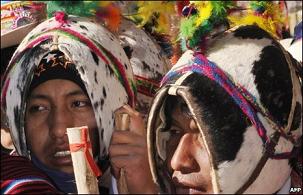Governments, Industry and Conservationists vs Tribal and Indigenous peoples. Aren’t There Better Ways to Mend the Earth?
An Earth Day Special

All Global Research articles can be read in 51 languages by activating the “Translate Website” drop down menu on the top banner of our home page (Desktop version).
Visit and follow us on Instagram at @crg_globalresearch.
***
“Who will suffer if 30% of Earth is “protected”? It won’t be those who have overwhelmingly caused the climate crisis, but rather indigenous and other local people in the Global South who play little or no part in the environment’s destruction. Kicking them off their land to create Protected Areas won’t help the climate: Indigenous peoples are the best guardians of the natural world and an essential part of human diversity that is a key to protecting biodiversity.” – Stephen Corry, director of Survivalist International [1]
LISTEN TO THE SHOW
Click to download the audio (MP3 format)
On the Earth Day organizing site earthday.org there is a lot of attention focused on climate change, regenerative agriculture, rejecting plastic, cleaning up or avoiding litter, conservation and restoration. There is however very little said about the role of Indigenous people in protecting natural habitats.
For example, the World Resources Institute’s official 2016 study, Climate Benefits, Tenure Costs: The Economic Case for Securing Indigenous Land Rights in the Amazon, found that securing and rights for Indigenous peoples in Bolivia, Brazil, and Colombia could generate billions of dollars in returns both local communities and for the world’s changing climate.
Canada’s Prime Minister Justin Trudeau did symbolically recognize the link however. In his Earth Day 2022 statement he said:
“We have much to learn from Indigenous Peoples who have been responsible stewards of the land, water, air, and all living things since time immemorial. We are supporting more Indigenous-led conservation initiatives across the country through the Indigenous Guardians and Indigenous Protected and Conserved Area initiatives.”[4]
The sad reality is that there may be a lapse between words and deeds. Recall for example how at a Liberal Party Fundraising event in Toronto, activists raised awareness that the government was lagging on commitments to fund a specialized mercury treatment facility to remediate damages caused by mercury poisoning from a Dryden chemical plant upstream of Grassy Narrows First Nation nearly sixty years ago. The physical impacts today included tremors, headaches, neuromuscular effects, memory loss and much more. [5]
This week’s episode of the Global Research News Hour pays tribute to the spirit of Earth Day by honoring the principal architects of true solutions. It also laments how many people in today’s society, including environmentalists, find themselves in adversarial positions with regard to respecting the land rights of these first people of the land.
First up, we hear from Judy DaSilva, a long time resident and spokesperson for Grassy Narrows First Nation. She discusses the mercury poisoning and several other environmentally damaging activities thrust on her community, talks about where this disrespectful attitude toward them comes from, and also talks about a new Indigenous-led event intended to bring healing and strength to her people, her allies beyond and to the world.
Our next guest, Stephen Corry is a long time director of the non-profit organization Survivalist International which focuses on partnering with tribal peoples throughout the Earth and campaigning, lobbying and protesting for their rights. Corry explains his group’s opposition to conservation the way it is traditionally practiced, his opposition to “protected areas,” and some of the roots of this modern ecological practice in the nineteenth century eradication of Indigenous peoples in North America.
Judy Da Silva is the environmental health coordinator for Grassy Narrows First Nation. She has hosted Environmental Youth Gatherings, Women’s Gatherings, Community Gatherings and Traditional Powwows. She helped inspire young people to develop a blockade against logging in 2002 which became the longest lasting such blockade in history. In 2013, she received the Michael Sattler Peace Prize from the German Mennonite Peace Committee for her work in nonviolent resistance of the Grassy Narrows First Nation against the destruction of nature and for the preservation of their Indigenous culture.
Stephen Corry is an Indigenous Rights activist and was since 1984 the CEO of the organization Survival International which works in collaboration with tribal peoples to campaign lobby and protest for their land rights, to investigate, expose and confront atrocities committed by governments and big business, and to amplify the tribal voice to make sure it is heard. In 1989, the organization received the Right Livelihood Award, with Corry himself giving the acceptance speech.
(Global Research News Hour Episode 352)
LISTEN TO THE SHOW
Click to download the audio (MP3 format)
The Global Research News Hour airs every Friday at 1pm CT on CKUW 95.9FM out of the University of Winnipeg. The programme is also podcast at globalresearch.ca .
Other stations airing the show:
CIXX 106.9 FM, broadcasting from Fanshawe College in London, Ontario. It airs Sundays at 6am.
WZBC 90.3 FM in Newton Massachusetts is Boston College Radio and broadcasts to the greater Boston area. The Global Research News Hour airs during Truth and Justice Radio which starts Sunday at 6am.
Campus and community radio CFMH 107.3fm in Saint John, N.B. airs the Global Research News Hour Fridays at 7pm.
CJMP 90.1 FM, Powell River Community Radio, airs the Global Research News Hour every Saturday at 8am.
Caper Radio CJBU 107.3FM in Sydney, Cape Breton, Nova Scotia airs the Global Research News Hour starting Wednesday afternoon from 3-4pm.
Cowichan Valley Community Radio CICV 98.7 FM serving the Cowichan Lake area of Vancouver Island, BC airs the program Thursdays at 9am pacific time.
Notes:
- https://survivalinternational.org/campaigns/biggreenlie
- https://www.earthday.org/about-us/
- https://www.history.com/this-day-in-history/the-first-earth-day?msclkid=900703b2c27211ecacfd7749ab00232e
- https://www.newswire.ca/news-releases/statement-by-the-prime-minister-on-earth-day-835655233.html?msclkid=bdc90159c27711ec8c254e9769c57682
- https://www.cbc.ca/news/canada/thunder-bay/grassy-narrows-celebrates-mercury-care-home-funding-1.6124129

